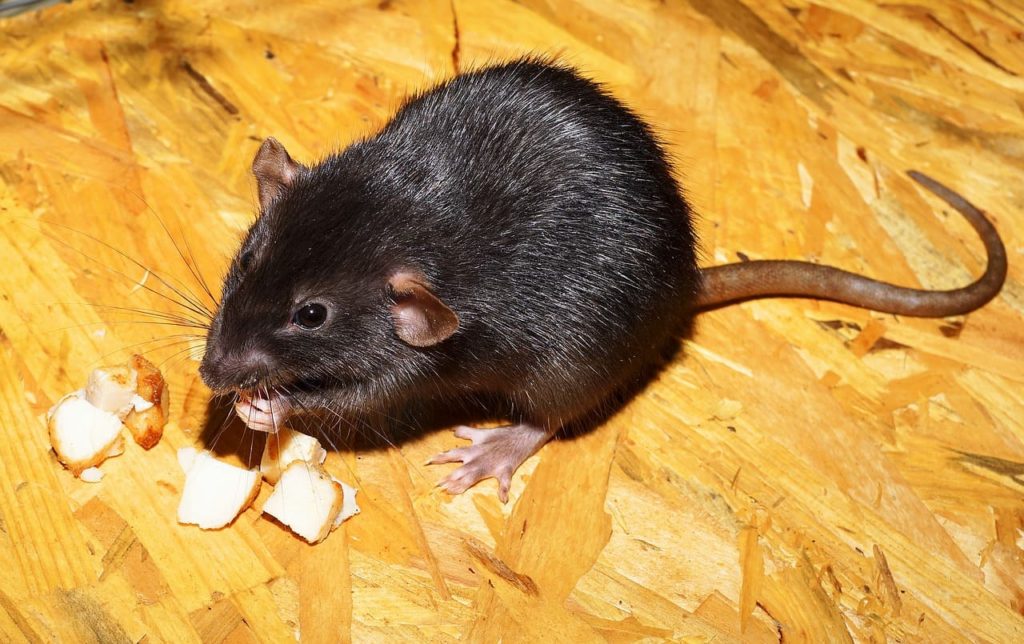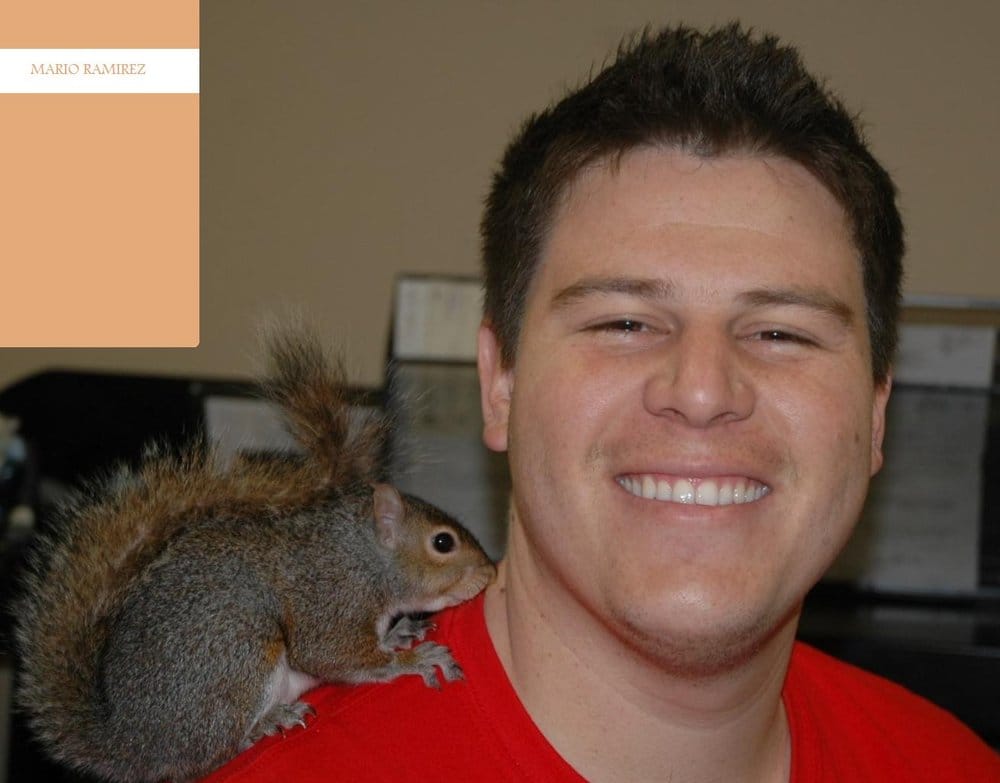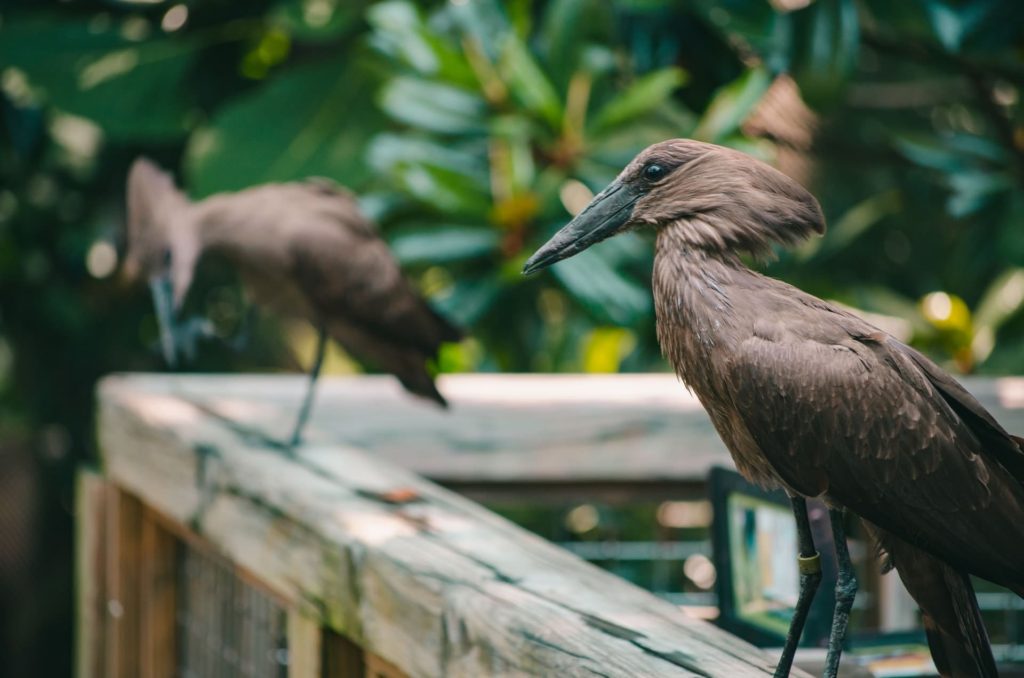In the state of Georgia, exterminators and wildlife professionals deal mainly with two kinds of rats: the Roof Rat and the Norway Rat. You may wonder what kind of diet each of these two rat species have; some argue that Roof Rats do not eat meat, and others will assure you that Norway Rats only eat greasy meats. After catching thousands of these animals, Forsyth Wildlife has experienced that both rat species eat meat, fruits, or vegetables, depending on what is available. Both species can be found in crawl spaces, living environments, and attics. It has been our experience that these unpredictable animals are impossible to classify based on diet. They are survivors and their unpredictable nature makes professional help a must.
Rat Management and Removal
When hearing noises at night it is very likely that your attic or structure is infested by rats. These creatures multiply very quickly and eat almost anything. From wood to insulation, rats can use a wide variety of materials to create nesting sites and favorable environments.
Problems with Rats
Rats can be very persistent and if they reach your home or business, they can spread diseases, they can cause damage even in hard surfaces and even contaminate your food or your pet’s food.
Among the most common problems our clients have encountered you may find:
- Damage property with their gnawing.
- They can damage insulation, pipes, doors, and even floorboards.
- Rats shred almost anything for their nests: Plastic, paper, etc..
- Contaminated food. If you suspect an infestation, be careful because their urine and droppings can transmit diseases.
Signs of Rats in Your Property
If you have found gnaw marks, or maybe those nasty small dark droppings, it could be a potential rat infestation. Don’t worry, check for these signs and call us to give you af free inspection: Forsyth Wildlife (678) 341-4945
- Rat droppings: Dark and small like a grain of rice.
- Rat holes: Their system for shelter, food storage and nesting.
- Rub marks, maybe some smudges on surfaces.
- Footprints or tail marks.
- Gnaw marks on wires, or items stored
- Rat nests
You can notice their signs easier than you can spot them because rats are usually most active during the night.
Don`t wait too much after seeing any of these signs to avoid that the potential infestation doesn’t spread any further. we can help! Talk to our experts about our fast effective methods and a free consultation.
Facts about Rats!
- Rats need to be excluded from human-inhabited buildings since they can be dangerous in many ways.
- Rat management is crucial if wires, cables, hoses, and pipes are existent in a building.
- Rats are known to chew on wires causing fires, chew on hoses causing floods, and chew on cables damaging entire networks.
- At the same time, rat excrement could be very detrimental to the health of humans and pets.
- Rats urinate and defecate at all times leaving their excrement on top of food and food preparation areas.
- Rat management is a must in all residential and commercial structures due to their rapid reproduction and potential to cause damage.
If you or someone you know suspects a rat infestation, please contact Forsyth Wildlife immediately in order to reduce damage and contamination.
Pest Removal and Animal Removal for Squirrels
Many homeowners try poisons, repellents, rat traps, and/or live cages to rid their structure of squirrels. While all of these are pest control techniques, in the case of squirrels the approach should be totally different. The use of poison is definitely a “no-no”. Poisons are many times slow acting and will be carried out by the squirrels into other environments where other types of animals could gain access to it, including pets. In addition, poisons that have been consumed by the squirrels could be ingested by non-target animals that will eat or carry dead squirrels in their mouths. This secondary poisoning could be fatal to other animals. Forsyth Wildlife cautions homeowners that poisons should not be used to control squirrels.
The use of repellents is common, but could be toxic to humans. A prime example of a repellant is moth balls. For years this poison has been used to repel snakes, squirrels, and other animals, but the negative effects moth balls have on humans far outweigh the benefits. Squirrel repellants usually work for a very short period of time and are carried away from target areas by rain or other environmental factors.
Using snap or rat traps to control squirrels may work in some cases, but killing the squirrel is not the easiest or best way to control these animals. Squirrels many times are a little bigger than what snap traps are designed for, so the squirrels may not die and will carry the trap to areas where human access is restricted. The injured squirrel many times carries the trap into areas like wall voids or under insulation, and once it finally dies, can be difficult to locate. Now you have a problem that still hasn’t been permanently resolved, and a foul smell to deal with. Snap traps are also hard to set and dangerous to remove. Human injury can occur for those who are not trained to set and/or remove traps.
Live cages are a better option, but if not combined with a full home exclusion this can be a never-ending job. Squirrels leave pheromones behind when they infest attics, which are highly attractive to other animals, making it almost impossible to catch all squirrels. Rats and mice are also attracted to this scent, which sends the message that says, “Come live here, it’s nice and cozy!” Other animals will also figure out the location of the trap, or the way it works and will avoid the devices altogether. Professional trappers will know how many traps to place, the optimal placement for them, and more importantly what entry areas to seal to prevent re-infestations.
Pest Control and Animal Control for Squirrels
Forsyth Wildlife strongly urges you against the use of poison to attempt to control squirrels. The outcome of its use is more often detrimental than helpful. Squirrels commonly die inside walls and underneath insulation, causing fly and odor problems that could last for weeks or months.
When squirrels have young, controlling them gets more complicated. Exclusion and hand-removal of the babies is the preferred option. Our professionals at Forsyth Wildlife relocate newly born animals while attempting not to harm them. They then attempt to relocate the young to suitable natural environments.
Nuisance Squirrel Removal and Prevention
What is in your attic?
Determining if you have squirrels?
Humane Squirrel Removal
Flies in my Home or Place of Business
Squirrels: Diseases, Preventions, and Cures
Preventing squirrels from spreading diseases requires exclusion of these animals from living environments. The only method of entry for some mites, flies, and other parasitic animals is by squirrels or other animals carrying them into the home, so if the squirrels can’t get in, neither can the other pests that they carry! If you already have a problem with squirrels and the contamination of your environment by excrement is severe, Forsyth Wildlife recommends the disinfection and/or removal of affected areas and insulation.
To cure diseases such as Leptospirosis and Salmonella, the aid of a doctor is required in many cases. Please consult a doctor if you have been exposed to severe infestations and or large amounts of excrement in a confined area.
Common Animal Damages and Repairs
Chewed Wires: As professionals we have seen animals chewing car wires inside the hood and cab of automobiles, electrical wires inside attics and walls, cables and internet wires, and entire home theater systems. The cost of the damages caused by animals can range from $100 to $500,000. As an example, one of Forsyth Wildlife’s customers bought a brand new car (T. Avalon); the second day rodents entered the vehicle and caused $7,500 worth of damage. The customer had to replace all the wiring inside the hood. This is just one of hundreds of customers that have faced similar situations. A house in Cumming, Georgia caught on fire and the fire marshal (fire investigator) ruled that the cause of the fire was a shortage cause by a chewed wire in the attic. This house burned to the ground, leaving a single mother homeless. This house was quoted by Forsyth Wildlife 8 months prior to the incident, but home owner never decided to hire professional services. She assured Forsyth Wildlife that her neighbor was trained and capable of solving the issue with rodents. Please hire a professional company when dealing with animals inside your attics and structures.
Chewed Pipes: As animals chew wires and cables, they also target pipes, as they have the round shape that is most attractive to wildlife. Rodents have chewed hoses and pipes connecting dishwashers and refrigerators which caused thousands of dollars to fix every time. Hundreds of our customer have faced devastating news when entering a flooded kitchen or bathroom. Even more aggravating is the fact that animals as small as a pinky are responsible for causing the damages. When kitchens are flooded, hardwood floors buckle, furniture gets moldy and many times a musky smell stays in the area for months. It is worth mentioning that even after all the damages are repaired, critters could come back and do it again. Please make sure that your house is sealed against animals by a trained professional.
Chewed Objects: From a $200 suit case to a $50,000 oil painting, Forsyth Wildlife has seen animals chew and destroy objects. Animals will chew objects trying to gather nesting materials, find a hiding place, or secure a food source. Many valuable objects are stored in areas with ideal conditions for wildlife such as attics and closets. These environments are frequently occupied by animals and rodents making it easy for them to chew and damage objects. In one case, rats chewed and damaged $ 20,000 worth of children’s clothing and toys since they were in storage for a period of three months. Some of the damaged materials included bedding, clothes, plastic bottles, diapers, cribs, camera monitors, and many more. Insurance was very difficult to collect and only paid about 45% of all damages.
Damaged Insulation: Many homes that have been infested by bats and raccoons have an undisputable need to remove and replace contaminated insulations since their excrement can be very toxic to humans. Most insurance policies in the state of Georgia will pay for the removal and replacement of contaminated insulation if raccoons or bats contaminated the insulation. In the case of squirrels and rats, replacement of insulation and decontamination may be needed if the infestation is heavy. Unfortunately, insurance doesn’t cover this since they expect owners to solve rat and squirrel problems as soon as they notice any signs. Rats and squirrels could damage insulation to the point of no return, but it definitely takes them longer to do so, compared to raccoons and bats.
Water Damage: Chewed pipes are not the only cause of water damage caused by animals. In thousands of homes animals will open entry areas around the outside soffit boards or roofs. These entry ways will allow water to enter structures by the gallons, creating mold and damages that can cost thousands of dollars to repair. When dealing with large animals such as squirrels and raccoons, their entry ways could be from the size of a baseball to a beach ball. If you have openings this size around the roof of your structure, water will cause more damage than any wildlife. We urge you to repair openings and animal entries before is too late. Make sure animals are captured and relocated before they try to open entry ways elsewhere.
Bird Control Techniques
Birds are a pest when invading buildings and structures. When they become pests, it is clear that Forsyth Wildlife needs to address the problem to prevent further damage and contamination in the future. Solving problems with pesky birds such as pigeons, woodpeckers, starlings and crows is not an easy task: Experience, equipment, and support are important tools in the process of bird eradication.
Problems with Birds:
You may have seen the mess they make and of course they can also damage your property.
Pest Birds could be a very serious issue thus requiring serious solutions and effective methods to control. These pests will contaminate roosting sites and areas around them. Their excrements will generate a number of lung diseases and they may bring other pests with them such as fleas, mites, and mosquitoes.
- Deface buildings and vehicles with their droppings. Foul entrances and pavements, making them dangerously slippery.
- Encourage insect infestations. For example bird mites, fleas or mosquitoes because they are attracted to their nests and roosting sites.
- Attack people, especially during the breeding season when they are defending their young.
- Be a health hazard, by spreading diseases such as Ornithosis, E.Coli and Salmonella.
Problems with Birds in your Business?
If you find birds in the wrong location, in particular pigeons, they can become a real nuisance for your business.
They may:
- Dislodge roof tiles
- Block gutters or
- Drive away your customers affecting your reputation
Techniques
At Forsyth Wildlife we will inspect and choose a bird control method that is the best suited for your needs. We know it can be difficult to solve the problem with just one technique, so if that is the case, we will try a combination of methods to find one bird control method that completely solves the problem. It often takes a combination of methods to control the issue.
Some of the more common methods are: exclusion, electrocution, sterilization, and trapping. Please call Forsyth Wildlife for more information on this subject.
You will also find different kinds of birds and they carry a number of diseases. If this is your case, it is best to call the experts at Forsyth Wildlife and avoid handling the problem yourself.
We will give you a free consultation for your unique situation based on our years of experience.
When Your Efforts are Not Enough
Sometimes these pests could bypass all efforts. Forsyth Wildlife offers a warranty on all services, so in the case of a pest bird reoccurrence, our company will stand behind the previously protected area (according to contract).
We focus on prevention so contact our experts in case you are not sure about the measures you need to take. We of course, help with eradication if given the case.












